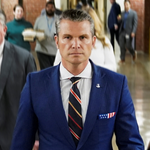
Forward!Photo: Getty Images
Everyone expected Barack Obama to give a hell of a speech on Thursday night — even his Republican critics, who have tried so hard to turn his eloquence against him. The question was not whether Obama would be stirring, poised, roof-raising. Of course he would. He always is. The question was whether he would be effective. Would he make the case for himself and against John McCain in terms more concrete, compelling, and thematically coherent than he has in the past few months? Would he pull together the threads of a Democratic convention that had offered sterling moments but still somehow been less than the sum of its parts? And, most of all, would he come across as a plausible president of the United States?
A bloody tall order, you might say, and you would be right. But here’s the crazy thing: Amid the flashing flashbulbs, the rapturous ovations, and the stomping of feet that made Invesco Field feel as if it were being rocked by an earthquake, Obama answered all those questions and more. In what ways exactly was the speech successful? Let me count them for ya.
1. Contrary to many pundits and partisans, I have always thought the most crucial work that the Obamans had to do in Denver was biographical — the introduction and explanation of this man, who much of the electorate still finds remote and mysterious, thus rendering him vulnerable to smears and insinuations about his otherness. Tonight, Obama used his personal story, both in his address and the terrific introductory film by Davis “Inconvenient Truth” Guggenheim, to root himself firmly in the American mainstream.
The invocations of his mother and grandfather and grandmother (the citation of whose rise from the secretarial pool to middle management, “despite years of being passed over for promotions because she was a woman,” was a brilliant nod to Hillary Clinton’s voters and their grievances) did much of this work, but Obama went beyond mere familial name-checking. As Bill Clinton did at his convention in 1992, Obama connected those dots to the struggles ordinary voters face under the yoke of the Bush economy. Barack Obama will never be, and should never try to be, a hot-eyed populist. But he rendered a cooler, yet still affecting, version of that creed in his speech tonight.
2. He put economics front and center, spelling out in detailed terms how his policies differ from his opponent’s. And though I still believe he has more work to do in fashioning an overarching economic narrative — a theory that helps voters understand what is happening to their jobs and incomes, and then explains how Obama’s plans and proposals will help them along the path to prosperity — the nominee provided the most lucid explanation I have ever heard from him as to what he sees as the role of government in the 21st century.
“Government cannot solve all our problems,” he said, “but what it should do is that which we cannot do for ourselves … [It] should work for us, not against us. It should help us, not hurt us. It should ensure opportunity not just for those with the most money and influence, but for every American who’s willing to work.” These are powerful concepts, simply stated, and ones that also offer a stark contrast to McCainonomics. They are the underpinnings of a New New Democrat creed, the logical extension of Clintonism, and perfectly in sync with what most working- and middle-class voters believe.
3. He made the case against McCain and the Republicans in clear, forceful, and at times (appealingly) mocking terms. He explicitly rebutted what are sure to be myriad claims next week at the Republican Convention that McCain is a principled maverick, happy to break with his party when the greater good is at stake, and made the obvious link of McCain’s record to that of Bush and the GOP over the past eight years. A killer line: “It’s time for them to own their failure.” And an even more killer exclamation: “Enough!” But, Obama went beyond the McCain-is-a-Bush-McClone argument (which I think has limited potential traction, actually) and linked him to a longer tradition, to “that old, discreted Republican philosophy” of unbridled laissez-faire. And he offered a couple of subtle hints as to where he intends to take the negative argument in the weeks ahead.
Hint one was Obama’s point that it’s not that McCain “doesn’t care what’s going on in the lives of Americans,” it’s that “he doesn’t know.” Hint two was Obama’s declaration that he’s happy to have a debate with McCain over who has the “temperament and judgment to be commander-in-chief.” To my ears, these sound like code phrases, the first suggesting that McCain is clueless (to the point, perhaps, of senility) and the second nodding toward his infamous temper. Will Obama go all the way there in the fall campaign? Before tonight, I would have said no. Now, I think he (or his surrogates) just might.
4. He used the speech to cleverly deconstruct the campaign that the McCainites have run against him — that he’s a feckless, unpatriotic, self-aggrandizing megastar who cares more about himself than the betterment of the commonweal — and throw it back in their faces. The two key lines: “I don’t know what kind of life John McCain thinks celebrities lead, but this has been mine,” and “I’ve got news for you, John McCain: We all put country first.”
5. He reinforced his brand — as a principled, high-minded practitioner of a new politics who rejects slash-and-burn tactics as divisive and spent — without eschewing tough-contrast campaigning. And he laid down some markers for the media as to what kinds of attacks he regards as beyond the pale. (Though whether the press will enforce those boundaries is another story.) “What I will not do is suggest that [McCain] takes his positions for political purposes,” he said. “Because one of the things we have to change in our politics is the idea that people cannot disagree without challenging one another’s character and patriotism.” This was a tactic that he and his people employed to great effect in their primary battle against Clinton: setting the terms of acceptable negativity. If it works half as well in the next 60-odd days, Obama will be in clover.
6. Finally, he refused to beat his audience over the head with the impossible-to-resist Martin Luther King allusions. As a former speechwriter for Bill Clinton observed to me in an e-mail, “He saved it until the very end, but didn’t take the easy path — the dream stuff — but worked it more subtly.” And not just subtly, but in a way that reinforced one of the central thematic thrusts of the speech: future versus past, forward versus back, change versus more of the same.
7. “Let us keep that promise — that American promise — and in the words of Scripture, ‘hold firmly, without wavering, to the hope that we confess’” was the only time in the entire speech that he used the H-word. And it was a quote from the Bible. Smart!
So the speech was perfect? No, it was not. For all its strengths, the speech did not frame the election in quite as crystalline form as I would have liked — or as McCain’s people have done. Their frame is this: McCain = country first, Obama = Obama first. And make no mistake, the Republicans will surely use the grandeur of tonight’s event, with its rock-star setting and Corinthian columns onstage, to suggest that Obama’s oration amounts to a domestic sequel to Berlin — that it’s Triumph of the Will comes to Denver.
But whatever the GOP attempts to do with the speech down the line, and despite its minor imperfections, Obama went a long way toward clarifying the choice that the country faces this November. As long as he realizes that the speech was not the final chapter of the argument but a prelude to be built upon, we may look back on tonight as the moment when, after two months of drift, Obama got his groove back.
Related: The Euphoria of Witnessing Obama’s Speech [NYM]
Obama’s Speech Hated, Too [NYM]





























